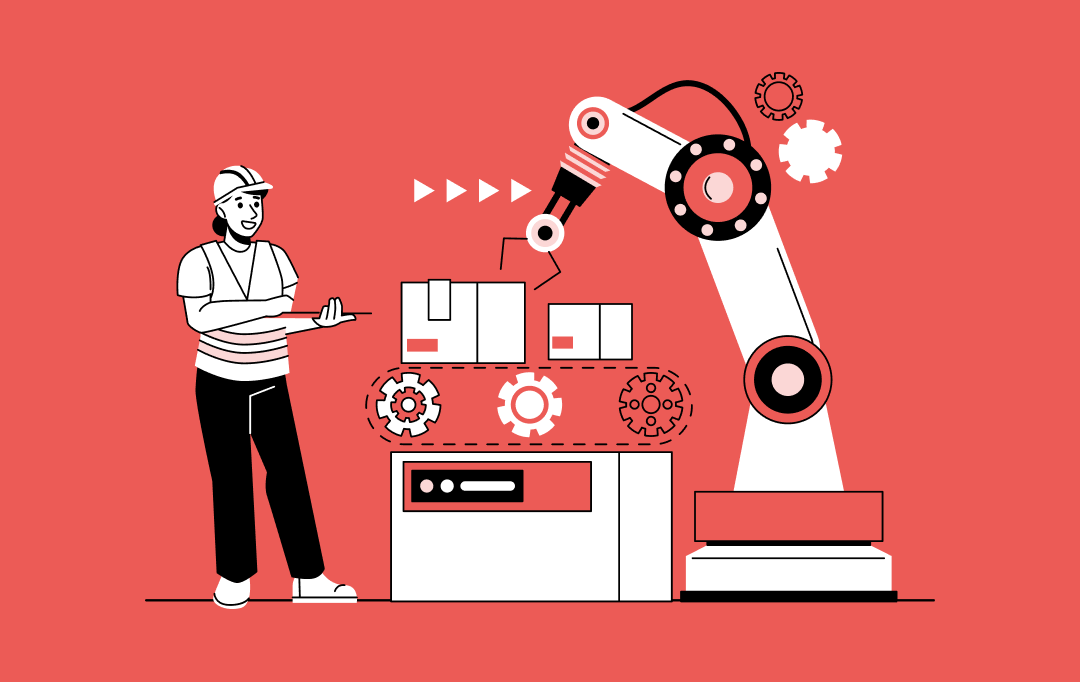- What is data-driven culture?
- What are the benefits of becoming a data-driven business?
- Improved efficiency
- Better communication
- Employee satisfaction
- Better customer service
- How to create a data-driven culture in your organization?
- Have a clear vision
- Hire data visionaries
- Keep data accessible
- Maintain proper data
- Data integration
- Encourage a data-driven mindset
- Train employees in data literacy
- Use data visualization tools
- Implement business intelligence solutions
- Follow standardized processes
- Role of a CEO in building a data-driven culture
- Challenges faced by organizations in becoming a data-driven culture
- Making a transitional shift
- Dealing with data
- Hiring employees
- Reliable data
- Tools and technologies
- Decision making
- Maintaining data-driven culture
- How can Appinventiv help you become a data-driven organization?
- Final Note
Today’s business environment is dramatically different from what it was ten years ago. This means that decisions are made based on data and analytics, rather than on gut feeling or intuition. Also, there has been a shift in corporate culture towards a more data-driven approach.
Data-driven cultures are often data centric, with data being used to characterize every aspect of the organization. In such cultures, data is seen as a valuable asset, and data-driven decision-making is seen as the best way to achieve success. This approach can help companies to be more efficient and effective in their data-driven processes and can lead to better outcomes.
In this blog post, we will discuss what is data-driven culture, and the benefits and importance of data-driven culture in an organization. We will also look at how businesses can create a data-driven culture and the challenges they may face.
What is data-driven culture?
A data-driven culture is an approach or mindset that organizations have where they rely on data as an aid in decision making and strategy planning. Data is collected from different sources like internal systems and external ones, analyzed, and then used to help drive business decisions. Companies with this kind of culture are always looking at ways to improve their profitability, efficiency, or productivity by using data.
Netflix is a good example of a company that has benefited from taking a data-driven approach. The online streaming giant uses data to educate everything from what content to produce to how to personalize the user experience. This has helped them become one of the most successful companies in the world.
A data-driven environment is also much more efficient than a non data-driven one, as it gives space for faster decision making and improved customer service. Also, as per the latest research, data powered enterprises outperform their competitors in business growth.
What are the benefits of becoming a data-driven business?
In today’s world, it’s not enough to be data-driven. The key is to become a data-driven company, which means that all employees are empowered to use data analytics to make decisions.
There are many benefits to having a data-driven culture in your organization. These include:

Improved efficiency
Employees who know what their numbers are and where they stand on various metrics like web traffic, customer feedback, call center conversations, and more can make better decisions about how they should spend their time, leading to less wastage of time and effort.
Better communication
Having one place where everyone can see the data helps with collaboration between departments because there’s less confusion about what’s happening in other areas of the company.
Employee satisfaction
Employees are happier when they have access to the information they need and feel like they can do their jobs effectively. Employees feel empowered when they have this type of access because they know what’s going on at all times.
A data-driven culture will help your business succeed as it provides an easy way for people within an organization or team to access their metrics and make better decisions based on those numbers.
Better customer service
A data-driven culture ultimately helps in delivering better customer services, which further leads to enhanced business growth for the organization.
Amazon and Google are the two major tech giants that have greatly benefited from a data-driven culture.
Amazon, in particular, has used data to its advantage in a number of ways. For instance, the company has used data to improve its customer service and recommendation engine. Additionally, Amazon has also used data to help it become one of the leading eCommerce platforms in the world.
Similarly, Google has used data to improve its search engine and advertising products. Additionally, the company has also used data to develop products, such as Google Maps and Gmail.
By now, it must be clear how data-driven culture can help organizations tackle tough challenges head-on, and stay ahead of the curve in the rapidly changing business world. A data-driven approach fosters innovation, creativity, and productivity by enabling organizations to make decisions.
So if you want your organization to thrive in the years to come, make sure to invest in a data-driven culture. How? Let’s hop on to the next section.
How to create a data-driven culture in your organization?
A data-driven culture is one where data is used to inform and guide decision-making at all levels of the organization. This approach can have a transformational effect on businesses, helping them to optimize operations, improve customer satisfaction, and drive growth.
When it comes to being data-driven, there are a few key things that you need to put in place. At the core of it all is a systematic process for gathering, cleaning, and storing data. You need to have processes like data discovery, data mining, data preparation, data integration, warehouse management, reporting and more in place to identify which data is important and track changes over time.
There are a number of factors that contribute to a data-driven environment. So, let’s delve deeper into the blog post.

Have a clear vision
Ensure to have a data-driven approach in your mind as it is important to have a clear and shared vision for what it looks like. This means that all levels of management are utilizing data to make informed decisions. By having a clear vision, you can shape the culture and the way your employees operate the business.
This not only leads to better decision-making but also helps the organization to achieve its goals more effectively. As a result, you will be able to create an environment that is conducive to innovation and creativity. Once the vision is in place, it should be communicated regularly and effectively to everyone in the organization.
Hire data visionaries
A data-driven culture requires people who are passionate about data and its potential to transform the organization. These individuals, known as data visionaries, are rare and highly sought-after. They are the ones who see the potential in data and are able to turn it into tangible results.
Data visionaries are not only experts in their field but are also able to articulate the value of data to those who are not. They understand how data can be used to improve data-driven decisions and drive business results.
If you want to create a data-driven culture in your organization, it’s important to hire data visionaries. These individuals will be instrumental in helping you create a culture that is open to change and willing to experiment with new approaches.
Keep data accessible
Data should be easily accessible to those who need it. This means having the right tools and infrastructure in place to allow for quick and easy data retrieval. It also means having data analysis tools that are user-friendly can be used by the team.
Data should be easily accessible to all employees, regardless of their role or level within the organization. This can be achieved through a variety of means, such as data visualization tools, data reporting tools, and data analytics.
Maintain proper data
Ensure that the data you’re using is clean and accurate. This may seem like a no-brainer, but it’s important to remember that data quality is the foundation of all data-driven decision-making and data-driven solutions that a company offers. This means making sure that there are no errors or discrepancies in your data set. To do this, you need to have a process in place for regularly checking your data.
Data integration
In order to make data-driven decisions, you need to have access to data from different sources. This data can come from internal sources, such as sales records, customer service logs, or external sources, such as market research reports.
The key is to ensure that all of this data is easy to access and integrate. Having a central place where all of your data is stored will make it much easier to use for data-driven solutions. In a data-driven culture, everyone from the top down is aware of the data and uses it to drive their decisions. This ensures that everyone in the organization is acting based on the best information available.
Encourage a data-driven mindset
A data-driven culture is one in which individuals are encouraged and empowered to use data effectively to make informed decisions. By adopting this mindset, individuals can work together to create a better understanding of their business, customers, and operations. In turn, this can help them becoming a data-driven business more quickly and efficiently.
Furthermore, a data-driven culture can also lead to a more open and collaborative environment, which is beneficial for both employee productivity and innovation. So, if you want to flourish your
company as the best data-driven organization, start by encouraging a data-driven mindset among all your employees.
Train employees in data literacy
If you want to create a data-driven culture, it’s important to ensure that all employees know how to work with the data. This means having a basic understanding of how to read and interpret data.
There are a number of ways to do this, but one of the most effective is to offer training and development opportunities. This can include workshops, webinars, or even online courses.
In addition, you can create a data dictionary that defines the terms used in your data set. This will help ensure that everyone is using the same terminology when discussing data.
Use data visualization tools
Data visualization can be a great way to help you understand and communicate data-driven insights. By visualizing data, you can make complex data sets easier to understand and identify patterns and trends. There are a number of different data visualization tools available, so it’s important to choose the one that best suits your needs. You can also get a custom data visualization platform developed as per your business needs from a reliable data analytics service company.
Cloud-based data analytics tools can be a great way to get started with data-driven decision-making. These tools typically offer a pay-as-you-go model, which makes them more affordable for small businesses. In addition, cloud-based tools are often easier to use and require less technical expertise.
Implement business intelligence solutions
Business intelligence solutions can help you turn data into actionable data-driven insights. These solutions typically include a varied range of features, such as reporting, management, and data analytics to help your business.
By using business intelligence solutions, you can make better decisions about where to allocate resources and how to grow your business. In addition, it can help you track Key Performance Indicators (KPIs) and identify areas of improvement for your business.
Follow standardized processes
The final piece of the puzzle is to have standardized processes in place. This means having a clear and repeatable process for data collection, analysis, tracking, and decision-making. As your organization grows, you can replicate the processes that have been proven to work. This will help you avoid the common pitfalls that organizations face when they try to scale their workflows.
Role of a CEO in building a data-driven culture
While all the factors given above are critical, achieving data-driven culture is not possible without the key initiatives of the CEO of the company.
The CEO can take the company’s culture to an entirely different level by keeping the company’s values, vision, and innovation intact. Listed below are five steps CEOs can take to foster a data-driven environment:
- Be passionate about the subject matter yourself
- Create a safe environment where employees feel comfortable sharing their findings with management
- Map out your company’s goals and identify the steps needed to achieve them
- Encourage your team to ask questions
- Hire the right people for your business
Challenges faced by organizations in becoming a data-driven culture
There are innumerable benefits to becoming data-driven, but not every organization is ready or willing to make the shift. Some of the common challenges faced by organizations include:
Making a transitional shift
One of the major challenges is making the shift from a traditional, siloed approach to data to a more collaborative and centralized approach. This can be difficult because it requires changing long-standing processes and culture.
Dealing with data
Not to be missed, data is spread all across different departments. This data needs to be collected, cleansed, and standardized before it can be used to make decisions. This can be a time-consuming and costly process.
Hiring employees
Getting employees to buy into the data-driven culture can be difficult because it requires a change in mindset and a willingness to embrace new ways of working.
Reliable data
Another challenge is the data itself. Not all data is created equal. Some data is more reliable than others. This can prove it difficult to trust the data and make decisions based on it.
Tools and technologies
We can’t deny the use of tools and technologies needed to support a data-driven culture. These can be costly and require specialized skills to use.
Decision making
The major challenge is changing the way decisions are made. In data-driven organization, decisions are based on data, not gut instinct. This can be difficult for organizations that are used to making decisions based on tradition or experience.
Maintaining data-driven culture
The last challenge is maintaining the data-driven culture. Once you have achieved it, it is important to maintain it. This can be difficult because it requires ongoing commitment from everyone in the company from the lower position to the higher position including CEO, CTO, and more.
These are just a few of the challenges that organizations face when trying to become data-driven. Overcoming these challenges is essential for organizations that want to make better use of their data and make more informed decisions.
How can Appinventiv help you become a data-driven organization?
If you’re looking to create a data-driven culture in your organization, Appinventiv can help. We specialize in building apps and software with digital solutions that can help drive data-driven processes and decision-making.
Our data analytics services cover a whole suite of solutions including Analytics Consulting, Data Warehousing, Business Intelligence, Data Visualization, and more.
For instance, we recently developed a full-fledged data analytics platform for a US-based telecom company. Our efforts led to 85% increase in data quality and accessibility and 26% reduction in maintenance costs for the company.
Reach out to us today in order to learn more about how we can help you create a data-driven culture in your organization.
Final Note
It is clear that there are many benefits to having a data-driven culture in your organization. However, building this type of culture can be a challenging task. The CEO has a critical role in setting the tone for data-driven decision making and ensuring that the necessary resources are made available to employees.
By following the steps we have outlined and hiring a reliable data service company, you can create a data-driven culture in your organization that will help you make better decisions and drive growth.




Unleashing the Role of Data Analytics in Driving Smarter Banking Decisions
The use of data analytics in banking is transforming how this data is interpreted and applied. Banks are using this data to make decisions that matter—fraud checks, loan approvals, or marketing campaigns. The focus has shifted: from storing data to using it smartly, and from pushing products to understanding people—being customer-centric. This shift is also…

10 Use Cases and Examples of How Pharmacy Data Analytics is Transforming Operations and CX
Data has become the currency of modern business, and the pharmacy sector is no exception. From inventory optimization to regulatory compliance, pharmacies today face many challenges that demand precision and agility. Well, pharma data analytics is solving all these conundrums as the main lead, a transformative approach that now empowers businesses to get actionable insights…

10 Use Cases and Benefits of Predictive Analytics in Manufacturing
Are you trying to stay in today’s manufacturing game with that old-school data analytics approach? Not gonna happen, buddy! Think about that old-school grind: manufacturing plant techies had to hustle around, scribbling notes and logging maintenance records by hand. All that manual intervention and hassle led to nothing more than messy data and bad calls.…

















